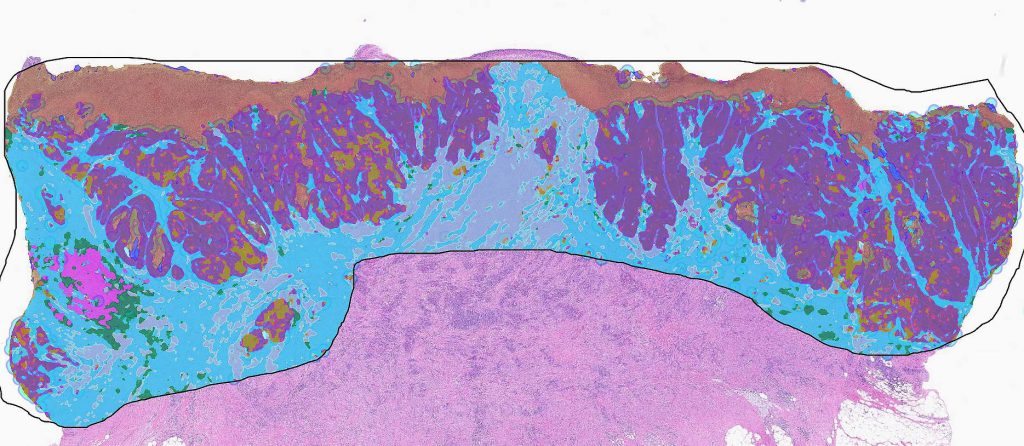-
Cancer
Mayo Clinic study shows AI may improve prediction of colorectal cancer recurrence
PHOENIX — In a multinational study led by a Mayo Clinic research team using artificial intelligence (AI), investigators developed an algorithm to improve the prediction of colorectal cancer recurrence. Study results are published in Gastroenterology.
Excluding skin cancers, colorectal cancer is the third most common cancer diagnosed in the U.S., according to the American Cancer Society.
Rish Pai, M.D., Ph.D., a pathologist at Mayo Clinic in Arizona and senior author, developed QuantCRC, a deep-learning segmentation algorithm, to identify different regions within tumors using nearly 6,500 digital slide images.

Fifteen parameters were recorded from each image of colorectal cancer and compared to the findings in the pathology report and health records. Then a prognostic model using QuantCRC was developed to predict recurrence-free survival.
The investigators used biospecimens of colorectal cancers from the Colon Cancer Family Registry participating locations in Australia, Canada and the U.S., including Mayo Clinic, to make up the internal training cohort. They validated the results with an external cohort of locations not participating in the Colon Cancer Family Registry in Canada and the U.S.
"QuantCRC can identify different regions within the tumor and extract quantitative data from these regions," says Dr. Pai. "The algorithm converts an image into a set of numbers that is unique to that tumor. The large number of tumors that we analyzed allowed us to learn which features were most predictive of tumor behavior. We can now apply what we have learned to new colon cancers to predict how the tumor will behave."
For example, the algorithm can identify a subset of patients who may not need to receive chemotherapy, given the low probability of recurrence. It also can help identify those patients at high risk of recurrence that may benefit from more intensive treatment or follow-up.
Dr. Pai says he hopes this study will be of value to patients with colon cancer, pathologists who look at colon cancer specimens, and oncologists who treat colon cancer.
"For patients with colon cancer, the algorithm gives oncologists another tool to help guide therapy and follow-up," says Dr. Pai.
The team of researchers from Australia, Canada and the U.S. concluded that QuantCRC provides a powerful addition to routine pathologic reporting of colorectal cancer. A prognostic model using QuantCRC could improve prediction of recurrence-free survival.
As a next step in his research, Dr. Pai says he plans to use QuantCRC to better understand mechanisms of tumor recurrence and see if it can predict the response to certain treatments, like immunotherapy.
Funding for this study was provided in part by the Colon Cancer Family Registry, which is supported in part by funding from the National Cancer Institute and National Institutes of Health (U01 CA167551).
In addition to Dr. Pai, other Mayo Clinic authors are Imon Banerjee, Ph.D.; Noralane Lindor M.D.; Bhavik Patel, M.D.; and Niloy Jewel Samadder, M.D.
For the full author list, disclosure information and a complete list of those who funded the study, see the paper.
###
About Mayo Clinic
Mayo Clinic is a nonprofit organization committed to innovation in clinical practice, education and research, and providing compassion, expertise and answers to everyone who needs healing. Visit the Mayo Clinic News Network for additional Mayo Clinic news.
About Mayo Clinic Comprehensive Cancer Center
Designated as a comprehensive cancer center by the National Cancer Institute, Mayo Clinic Comprehensive Cancer Center is defining new boundaries in possibility, focusing on patient-centered care, developing novel treatments, training future generations of cancer experts, and bringing cancer research to communities. At Mayo Clinic Comprehensive Cancer Center, a culture of innovation and collaboration is driving research breakthroughs that are changing approaches to cancer prevention, screening, and treatment, and improving the lives of cancer survivors.
Media contact:
- Gerri Kelly, Mayo Clinic Communications, newsbureau@mayo.edu







